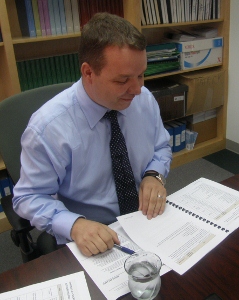Archive for January, 2012

Prison focuses on rehab
 (CNS): Government will be placing far greater emphasis this year on the rehabilitation of offenders serving time in the prison system with the aim of reducing the high rates of recidivism. The prison revolving door owes much to the inability of offenders to find work once released, driving them back to survival through crime and ultimately back to the prison. Having secured government funding for full time teaching staff and support from the business community, the prison will now be much better placed to address inmates’ skill sets and equip them for a crime -free life when they return to society.
(CNS): Government will be placing far greater emphasis this year on the rehabilitation of offenders serving time in the prison system with the aim of reducing the high rates of recidivism. The prison revolving door owes much to the inability of offenders to find work once released, driving them back to survival through crime and ultimately back to the prison. Having secured government funding for full time teaching staff and support from the business community, the prison will now be much better placed to address inmates’ skill sets and equip them for a crime -free life when they return to society.
A combination of government cash, training by the education ministry, community support from the business sector and volunteers, as well as the findings in a new report due out this month, will help shape a new way forward for a full rehabilitation programme for prisoners as they serve their sentences and continuing through into the community.
Key to the rehabilitation is addressing the literacy problems which affect around 80% of inmates. Until now the prison has depended heavily on volunteers but this year HMP Northward will have its own full time literacy tutor and the Ministry of Education will also be teaching at least 6 prison officers to become reading tutors.
The plans for a full time education programme that can address the needs of all the prisoners, from those who cannot read to those seeking a useful skill to use on the outside, government hopes to address the persistently high levels of repeat offending.
On Tuesday prison staff and inmates welcomed representatives from the University of the West Indies and local law firm Mourants to officially launch two pilot courses for inmates, which are already over-subscribed.
Twelve inmates are currently on the computer maintenance course, which will now be accredited by the university and funded by Mourants. The course, which is taught by a prison officer who is also a technology expert, meets industry standards and takes inmates from not even knowing how to open a computer to being able to repair a range of engineering problems .
Just one of a range of classes and educational opportunities now planned by the prison, Kathryn Dinspel-Powell from the Portfolio of Internal Affairs, who is currently co-ordinating the review of the system, said that the key to inmates' rehabilitation was literacy. Without basic reading skills there are few courses that the inmates can take and gain qualifications they can use on the outside. Natalie Ceasar, the prison’s education co-ordinator, said that the new literacy tutor will co-ordinate all of the prison’s existing programmes and will oversee the training of prison staff tutors, as well as the various external support from volunteers and other tutors.
The Institute of Public Administration of Canada, which was commissioned to review the system and produce an independent report, will be publishing their findings this month and Dinspel-Powell said the findings in that report will guide future spending plans but education will be at the core of the new rehabilitation strategy. The goal will be to shape rehabilitation programmes for prisoners that will also involve their families to ensure the support goes beyond the prison walls.
With the prison system budget running at more than $14 million, inmate numbers rising and crime at an all-time high, there is a pressing need for government to address the failing system and concentrate on rehabilitating every prisoner returning to the community.
In an interview with CNS in 2011 Franz Manderson, the chief officer of the Portfolio of Internal and External Affairs (and now the Deputy Governor Designate) said that tough prisons don’t work. “Tough prisons do not make good prisoners, just tough prisoners,” Manderson said as he pointed to the portfolio’s goal to tackle recidivism through rehabilitation.
He said the public needed to understand that the loss of liberty is the punishment and that when inmates are incarcerated they should not be mistreated by the system itself but given an opportunity to change their ways.

Review team extends consultation on rollover
(CNS): The window of opportunity for the public to offer its opinion on work permit holders term limits — otherwise known as rollover — has been extended until Monday to allow as many people as possible to express their opinion. Officials said Tuesday that over 600 people and 80 businesses have already responded to the survey and education initiative launched by the review committee last month. Appointed by Cabinet to review the immigration law’s term limit provision, the committee is looking for input to guide the recommendations it will make to government on how it can deal with Cayman’s thorny issue of balancing labour market needs with limited status grants.
Government suspended the rollover policy in September by allowing people who had reached their seventh year to apply for a term limit extension period for up to two years to prevent what officials believed could be an exodus of some 5,000 workers in 2012. The review team was given six months to come up with a new policy proposal to facilitate the importation of skills and labour but which will also stop every foreign national from being able to claim residency rights.
The committee’s terms of reference include examining the effectiveness of the current term limit provisions and its impact on the social and economic interests of the Islands, the fee structure associated with the grant of work permits as well as the issue of the ‘key employee’ provision.
Officials said that public feedback to date shows diverse positions on the issue of term limits and all residents can contribute to committee’s official report. The anonymous survey is divided into two sections: the Social and Economic Impacts of Rollover on Individuals, and the Social and Economic Impacts of Rollover on Individuals.
“We appreciate the public involvement so far, and look forward to gaining even more input over coming days,” said TLRC Chairman Sherri Bodden-Cowan.
More than half of the individual respondents to the survey so far have been Caymanians or status holders and the majority say they have not suffered any adverse professional or economic impact from the policy but more than half had friends or acquaintances who were rolled over.
Half of these people feel rollover should be discarded, while 20% said it should remain and 16% feel the employment period should be extended and 14% feel it should be shortened.
Government and statutory authorities was the largest sector participating to date, followed by the accounting/financial, education and financial sectors. 83% of those surveyed earn between $3,500 and $6,000/month and the next-largest group earns $2,000-$3,500.
Among the businesses responding, almost half represented the tourism/hospitality sector, which is the industry believed to be the most adversely affected by the policy. The next largest group was the financial sector, though businesses involved in retail, employment, construction or landscaping, legal, education, real estate and healthcare also took the survey.
When businesses were asked what other issues impacted their business, 46 percent cited the cost of doing business, such as utilities, accommodations costs and salaries. The global economic conditions, the Islands’ reputation and the cost of annual government fees were also listed by around a third of respondents. 54 percent of the businesses have seen increases in their human resources and operating costs and similarly just over half have seen decreases in their profit margin and productivity.
Private individuals, companies and non-governmental organizations can also send written submissions by 15 January to Cayman Term LimitReview Committee, PO Box 391 Grand Cayman KY1-1106.
To complete the survey or for more information, click here.

Jam contractor general asks PNP to stop CHEC talks
 (CNS):Jamaica’s contractor general is calling on the new People's National Party government to stop the negotiations with China Harbour Engineering Company (CHEC) over the US$600-million North-South Link Highway 2000, which involves granting a 50-year toll concession to the company. Greg Christie has raised concerns about the project and sought a meeting with the new administration to canvass its opinion on recommendations and "strong objections” to the former government’s intention to award the contract to CHEC without a competitive tender. The Beijing based firm, which is also in negotiations with the Cayman government to build the George Town cruise port, has been at thecentre of a public contract controversy in Jamaica.
(CNS):Jamaica’s contractor general is calling on the new People's National Party government to stop the negotiations with China Harbour Engineering Company (CHEC) over the US$600-million North-South Link Highway 2000, which involves granting a 50-year toll concession to the company. Greg Christie has raised concerns about the project and sought a meeting with the new administration to canvass its opinion on recommendations and "strong objections” to the former government’s intention to award the contract to CHEC without a competitive tender. The Beijing based firm, which is also in negotiations with the Cayman government to build the George Town cruise port, has been at thecentre of a public contract controversy in Jamaica.
"The OCG continues to maintain that the current negotiations between NROCC (National Road Operating and Constructing Company Limited) and CHEC should be terminated forthwith, and that the said transaction, irrespective of its structure, should be subjected to a transparent and international competitive bidding process whereby value for money can be secured for the benefit of the people and taxpayers of Jamaica," Greg Christie said Monday, the Jamaica Observer has reported.
The contractor general said his office was amazed and alarmed that the former JLP administration was persisting with what could be another controversial sole-source contract award to CHEC, despite ongoing public controversies, audits and OCG investigations which have arisen in consequence of a similar sole-source award of the US$400-million JDIP contract to the same company.
The selection of JDIP sub-contractors should be subjected to an OCG-supervised competitive tender process giving his office the ability to better scrutinize the particulars of all such sub-contracts, Christie said.
In a letter to the new prime minister on Friday, her first day in office, Christie said he was ready to meet with Portia Simpson-Miller or a government representative as soon as possible to discuss the issue and learn the “direction” the new administration was prepared to take regarding his recommendations and the PM’s commitment to fight corruption in Jamaica.
Cayman football boss tipped to head regional body
(CNS): The President of the Cayman Islands Football Association is being tipped as the next President of the Confederation of North, Central American and Caribbean Association Football (CONCACAF) according to Insideworldfootball. Jeff Webb who has been leading the effort to put Caribbean football back on its feet after months of scandal is the man the majority of CONCACAF members want to step into Warner's shoes is the specialist football website has reported. With critics in the organization concerned that the Confederation is too top-heavy with North American powerbrokers Webb could be the man to restore the balance of power at senior executive level.
As well as running Cayman Islands football, Webb is also chairman of the nine-man normalisation committee charged with restoring the Caribbean's reputation and he is also a member of one of the four task forces created to reform FIFA.
Webb told the website that he would be interested in the job of bringing some transparency back to CONCACAF which has been riven with divisions. "Right now we are trying to stabilise Caribbean football because we've lost sight of our core focus which is football," said Webb. "We'll have new statutes in March ahead of full elections in May. But CONCACAF needs an overhaul as well and I do think I would have a contribution to make."
Webb said that CONCACAF – which covers north and central America and the Caribbean – needed to distribute its funding more equitably. "Just like the CFU it needs restructuring," Webb explained.
"I would like to see it assisting its members and sharing some of its revenues. I'd like to see more of that money helping some of the grassroots programmes in smaller countries, both in the Caribbean and central America."
When Warner resigned from FIFA over the cash-for-votes scandal, Webb said he was "deeply saddened" but said it was now time to stop all the bickering. "I'd just like to see it resolved so we can all move on," he added.

Scammers seek credit card details via computer con
 (CNS): The Financial Crime Unit is warning the public of a new scam where con artists are trying to get credit card details from their victims posing as representatives from Microsoft. The financial cops report that a small number of people on Island have reported receiving a call from someone purporting to be from Microsoft stating that they have received an error message relating to their computer. Offering to repair the computer system remotely the scammers request the victim provides credit card details. Officers from the RCIPS said.the story about the error message is, of course, fictitious but the victims who have been sucked in by the con have found that anywhere from $99 – $200 has been taken from their credit card account.
(CNS): The Financial Crime Unit is warning the public of a new scam where con artists are trying to get credit card details from their victims posing as representatives from Microsoft. The financial cops report that a small number of people on Island have reported receiving a call from someone purporting to be from Microsoft stating that they have received an error message relating to their computer. Offering to repair the computer system remotely the scammers request the victim provides credit card details. Officers from the RCIPS said.the story about the error message is, of course, fictitious but the victims who have been sucked in by the con have found that anywhere from $99 – $200 has been taken from their credit card account.
“This takes scamming to a new level in the Cayman Islands,” said Detective Chief Inspector Claudia Brady.
“ The scammers are becoming much more sophisticated and that’s why people need to be much more vigilant when they take such calls. We have made all the necessary checks with Microsoft representatives and we can assure people that no-one from the company would contact them directly.”
Brady explained that any contact with Microsoft in relation to computer error issues would be initiated by the computer user and not the company.
“Once again, we are urging people not to give out their credit card / bank details over the phone, or over e-mail, under any circumstances. Do not start off 2012 being a victim of a scam,” she warned.
Anyone who wishes further information about how to avoid becoming a scam victim should contact the RCIPS Financial Crime Unit on 949-8797.

Public accounts poor quality
 (CNS): Although government has made strides on the timely submissions of public accounts to his office, the auditor general says there are still significant concerns about the quality of the information, especially by ministries and portfolios, being submitted. Alastair Swarbrick said Tuesday that while there had been a significant effort to address the backlog and meet reporting deadlines, government must now focus on the quality of the information being presented for audit. In his latest report on the progress made by government on financial reporting and performance accountability he said the goal now is for government to match improvements in timeliness with improvements in quality.
(CNS): Although government has made strides on the timely submissions of public accounts to his office, the auditor general says there are still significant concerns about the quality of the information, especially by ministries and portfolios, being submitted. Alastair Swarbrick said Tuesday that while there had been a significant effort to address the backlog and meet reporting deadlines, government must now focus on the quality of the information being presented for audit. In his latest report on the progress made by government on financial reporting and performance accountability he said the goal now is for government to match improvements in timeliness with improvements in quality.
He said that although eight entities still failed to make the deadline for the 2010/11 financial year end accounts, 30 public authorities, ministries and portfolios had made the 31 August date, giving his office enough to begin the audit process.
However, the public auditor said it was difficult to say whether the quality of information submitted would mean that the first set of consolidated government accounts since the Public Management and Finance Law was implemented some eight years ago would be of sufficient quality to enable the public to gain a comprehensive view of how government has spent public money in the last financial year.
When the accounts are audited however, Swarbrick said his office would assist in the interpretation of the results and hopefully help the public understand what the results mean. He also said the production of the consolidated accounts still represented a significant step in the right direction.
Although quick to congratulate government on the efforts made, Swarbrick warned that getting accounts in on time was only the first step in the process of government's accountability to legislators and the public at large.
The quality and credibility of the accounting and performance information government submits for audit is important, he said, as the reports are fundamental when it comes to informing legislators and the public how the dollars collected from them in duties and fees are used.
“It is important that legislators and decision makers have good financial information on which to base their decisions,” Swarbrick said. “The information has to be as reliable and accurate as possible as well as timely.” He explained that the information is how legislators hold government to account for the money it has spent and how money should be used and appropriated in future years.
“It is very important for the general public to be able to see how the fees and duties they have paid have been used and what the position of government is. It also informs their own debate about how money should be used and spent,” Swarbrick added.
The auditor general warned that, despite the efforts of government to address the backlog and submit accounts to his office on time, he would still be issuing qualified opinions because in many cases, the ministries and portfolios in particular, the starting point for the accounts is based on unreliable information.
Swarbrick said that his office would be able to give a more detailed review of the state of the government's accounts in his next quarterly review but what was clear now was the need for the administration to focus on quality. The audit office, he said, would do all it could to help government entities improve the credibility of the information they submit to his office.
The auditor warned again that even when the timeliness and quality of submissions improves the reports need to be in the public domain as soon as possible and he noted that 61 completed and audited reports had still not been tabled in the Legislative Assembly and were still not public documents.
He acknowledged that the immense backlog of reports had played a part in the failure of ministries to table the finished reports but he pointed to the fundamental point of them being made public.
As government goes to work in an effort to create consolidated accounts for the financial year end 30 June 2011, most of the reports for the year ending June 2010, which relates to the UDP's first financial year in office, have not yet been tabled.
The majority of those reports have been audited but 28 of the 38 reports have still not been made available to the public.
In his report Swarbrick also reveals that Cayman Airways, the museum, the National Drug Council, the gallery, the tourism attraction board, the turtle farm, UCCI and the housing trust on the Sister Islands were the only public entities that submitted insufficient information for audit for the last financial year.
See full government accounts update report here

Men seriously abuse conch catch limit
 (CNS): Two fishermen apprehended by the police in East End on Monday were found in possession of forty-two times the legal limit of conch. The men were arrested yesterday afternoon at around 2:30 on suspicion of a number of marine offences, including taking conch in excess of the prescribed limit. Officers from the Joint Marine Unit and Bodden Town police station carried out the operation near the district's public beach, when the two men aged 37 and 41 years were also found in possession of an illegal spear gun, 3 lobsters and 421 conch.
(CNS): Two fishermen apprehended by the police in East End on Monday were found in possession of forty-two times the legal limit of conch. The men were arrested yesterday afternoon at around 2:30 on suspicion of a number of marine offences, including taking conch in excess of the prescribed limit. Officers from the Joint Marine Unit and Bodden Town police station carried out the operation near the district's public beach, when the two men aged 37 and 41 years were also found in possession of an illegal spear gun, 3 lobsters and 421 conch.
Inspector Richard Harford of Bodden Town police station said the Marine Conservation Law strictly limits the number of conch that can be taken per day. “The law is quite clear,” he said. “A person can take five conch per day, or ten per boat. The two men arrested yesterday paid no heed whatsoever of the law or of the need to conserve the valuable marine life in the Cayman Islands.”
A police spokesperson confirmed that it was too late to return the seized conch to the sea so the catch was donated to the Department of Family Services and the Pines retirement home.

Coastal works pose threat
 (CNS): A coastal works application made by a Dart owned company to dredge two canals inland at Vista Norte in the West Bay area will have an irreversible adverse impact on the marine environment in the North Sound, government conservation experts have warned. According to a memo sent by the Department of the Environment to the ministry regarding the application, the two canals will destroy over 138,000sq.ft of sea grass and remove over 161,000 cubic yards of material. The work’s application by Crymble Land Holdings for the proposed canals — one 2,135 feet in length and the second more than 1,500 feet — are to serve a proposed canal-based hotel and tourism development and take almost three years to dredge.
(CNS): A coastal works application made by a Dart owned company to dredge two canals inland at Vista Norte in the West Bay area will have an irreversible adverse impact on the marine environment in the North Sound, government conservation experts have warned. According to a memo sent by the Department of the Environment to the ministry regarding the application, the two canals will destroy over 138,000sq.ft of sea grass and remove over 161,000 cubic yards of material. The work’s application by Crymble Land Holdings for the proposed canals — one 2,135 feet in length and the second more than 1,500 feet — are to serve a proposed canal-based hotel and tourism development and take almost three years to dredge.
The details of the application and the DoE’s concerns were revealed in a memo released following a freedom of information request made by a CNS reader. The memo shows that the DoE recommended that the application made in September be held in abeyance until a master-plan has been submitted for the entire development, which covers some 340 acres.
The DoE’s environmental assessment officer stated in the memo that the department would need to see a “full and robust justification” for the extensive dredging works because of the adverse impact it would have. However, the agent was unable to supply the DoE with any information as the plans were not completed. The department official pointed out that government would be negligent to authorize these significant dredging works without seeing a plan for the development.
The department also recommended that a full Environmental Impact Assessment be undertaken on the project with the terms of reference being established by a specially convened environmental advisory board.
This is a requirement that the developer would be obligated to undertake if the stalled National Conservation Bill had been passed.
The issue of dredging continues to raise controversy as developers seek ways to provide access to the ocean for the wealthy boat owners that they hope to serve with their high-end projects. But the impact of dredging on the local marine environment can be devastating. Local conservation experts have warned that dredging continues to be one of the most significant threats to the local marine environment and should be avoided wherever possible.
See DoE memo below.

Gunmen rob GT pharmacy
 (CNS): Update 10:20am — Police have now released descriptions of the two armed and masked men who stole a cash register and a sum of money from the Valu-Med Pharmacy in Walkers Road last night, Monday 9 January. The first suspect was described by witnesses as wearing a ‘soldier-type’ camouflage jacket. The second suspect was also wearing a camouflage jacket with a brown towel and a tam on his head. Police say that about 8:30 pm on Monday the two suspects entered the premises. One of the suspects ran to the back of the store where he threatened the cashier with what appeared to be a handgun and demanded cash.
(CNS): Update 10:20am — Police have now released descriptions of the two armed and masked men who stole a cash register and a sum of money from the Valu-Med Pharmacy in Walkers Road last night, Monday 9 January. The first suspect was described by witnesses as wearing a ‘soldier-type’ camouflage jacket. The second suspect was also wearing a camouflage jacket with a brown towel and a tam on his head. Police say that about 8:30 pm on Monday the two suspects entered the premises. One of the suspects ran to the back of the store where he threatened the cashier with what appeared to be a handgun and demanded cash.
The second suspect threatened another cashier and demanded that she open the cash register at the front of the store. When she did not do so the suspect ripped the register from the counter. Both suspects then ran from the store with the register and a sum of cash. As they made off from the scene the robbers dropped some of the money in the Leafy Lane area.
No shots were fired and no one was injured in the incident. However, the cashiers who were within the store have been left shaken by the ordeal.
Anyone who was in the area at the relevant time last night and saw either of the suspects before the robbery, or fleeing the scene, is asked to contact George Town CID on 949-4222. Information can also be passed via the RCIPS Tip-line 949-7777 or Crime Stoppers 800-8477(TIPS).

Cayman’s teen skier to make Olympic youth debut
 (CNS): Following in the tracks of his older brother, Dean Travers will be making his first Olympic appearance this month at the Inaugural Winter Youth Olympic Games in Innsbruck, Austria. The teen skier will be representing the Cayman Islands in Giant Slalom, which will take place on 19 January. Dean, who is a freshman at Aspen High School where he competes for the Aspen Valley Ski and Snowboard Club, is the son of Anthony Travers, the chairman of the Cayman Islands Stock Exchange. Dean took the bronze medal in the 2009 giant slalom at the Whistler Cup and the gold medal in the super-G race this year at the Whistler Cup in British Columbia. Fingers are now crossed for a great showing by Dean in Austria.
(CNS): Following in the tracks of his older brother, Dean Travers will be making his first Olympic appearance this month at the Inaugural Winter Youth Olympic Games in Innsbruck, Austria. The teen skier will be representing the Cayman Islands in Giant Slalom, which will take place on 19 January. Dean, who is a freshman at Aspen High School where he competes for the Aspen Valley Ski and Snowboard Club, is the son of Anthony Travers, the chairman of the Cayman Islands Stock Exchange. Dean took the bronze medal in the 2009 giant slalom at the Whistler Cup and the gold medal in the super-G race this year at the Whistler Cup in British Columbia. Fingers are now crossed for a great showing by Dean in Austria.
The support team for Dean will be Jennifer Powell as Chef de Mission, CIOC President Donald McLean, along with Jake Zamansky as coach and his brother Dow who will assist the coach on the slopes. Dow was the first ever Caymanian skier to attend the winter Olympics when he represented Cayman at the Vancouver 2010 Winter Olympic Games. Like his older sibling, Dean began skiing at an early age when his family began vacationing at Beaver Creek.
The games are an international multi-sport event for winter sports held under the auspices of the International Olympic Committee (IOC) and the summer games were first held in Singapore in 2010. The games will be held every four years in staggered summer and winter events consistent with the current Olympic Games format.
The Games will also feature cultural exchange programs and opportunities for participants to meet Olympic athletes. Innsbruck 2012 aims to inspire young people around the world to embrace, embody and express the Olympic Values of Excellence, Respect and Friendship. Olympic traditions will meet modernity.